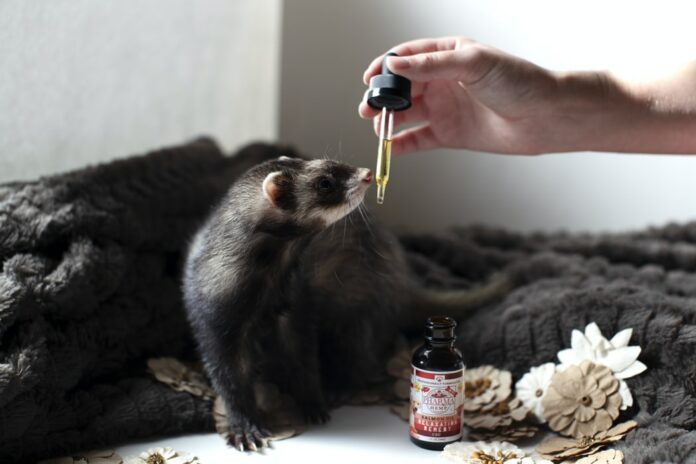There’s quite a bit to learn when it comes to good ferret care.
Ferrets are more of a challenge and require more attention and care than other pets like dogs and cats. But they’re so intelligent and fascinating, you’ll probably find that they’re well worth the effort.
Though they sleep about 18 hours per day, when they’re awake they’re very active. They’re also extremely curious and love to explore. Unless they’re always caged, that makes them somewhat accident prone. If they’re always caged, they may not get the proper stimulus and exercise, representing the other side of the dilemma. Just make sure they’re always supervised when out of their cage. And keep them confined to a small, safe area.
Beyond basic safety, though, there are regular actions that any caring ferret owner will want to take to ensure their companion is kept in optimal mental and physical health. Ferrets live on average between 6-8 years and much of those they will need attention and checkups.
The most basic care starts with a vet visit for a general checkup and vaccinations. Rabies and canine distemper are the two most common diseases vaccines prevent, but ask your vet about others that may be a concern in your area. At the same time, the vet will check for lumps (evidence of possible insulinomas and other tumors), dental issues, possible adrenal problems and other ferret-specific conditions.
Ferrets have abilities that can more easily lead them into trouble. They can find their way into spaces that even a small cat wouldn’t consider. Ferret-proofing the house against ingress behind the stove, getting inside the couch, falling off the second floor landing and other areas is essential.
Bathing twice a year is a good idea, both to reduce odors and keep the skin healthy. But beware of removing essential oils. Only use a shampoo designed for ferrets. Regularly look for any skin lesions or sores. Ferrets have sharp claws and, like dogs, can produce hot spots that lead to pain and possible infection.
Ear cleaning should be performed at least once per month. Like dogs, ferrets can easily build up wax that leads to yeast and other problems. A simple ear cleaning solution injected with a plastic syringe, followed by gentle massage for about 20 seconds, will do the trick. The ferret will shake his or her head vigorously and expel the softened wax. Careful follow up with a Q-tip is a good idea.
Regular examination of both ends of your ferret may not be pleasant, but it’s best for your pet. They often burrow into litter box material that, if not the proper kind (and sometimes even then), can cause nasal blockage. That can lead to upper respiratory problems, irritation of the membranes or other conditions.
Also, make sure they have no swelling of the vulva (evidence of disease) or a prolapsed rectum. The latter can result from inadequate water in the diet or a bacterial infection that results in straining. Treatment with an antibiotic, such as Clavamox or Baytril may be called for.
Regular activity outside the cage helps keep your ferret mentally stimulated and works all those muscles that some cages don’t allow. Take care they don’t get outside off a leash, though, unless the area is enclosed and free of holes. Ferrets naturally seek out burrows and small spaces to explore. But they are much better at getting in than getting out.
They also don’t tolerate high heat or extreme cold well. Above 80°F (26.5°C) or below 45°F (7°C) represents a risk to your ferret. The warmer it is, the more important it becomes to have cool, fresh water available. And, unlike their cousins the minks, their fur isn’t designed for very cold weather. Keep them inside when the temperature dips.
Get as much information as you can about ferret care from your veterinarian, other ferret owners, and through books (available at your public library or at Amazon). Learning how to care for ferrets is something that won’t happen overnight, but you should know the basics before bringing a wonderful ferret into your home.




















